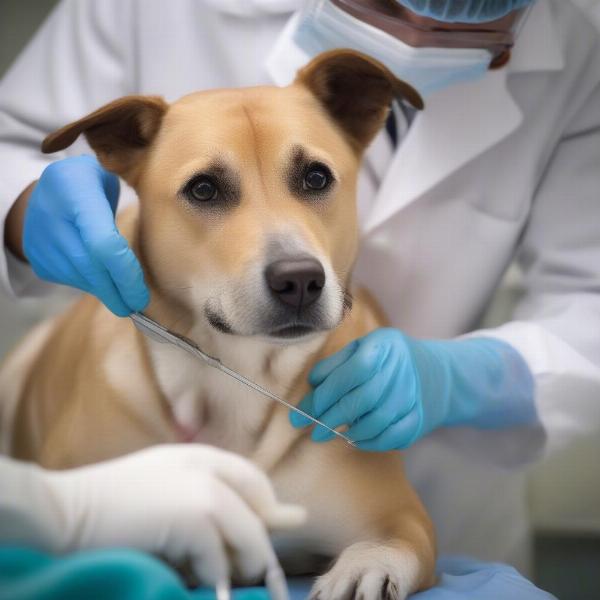Ear cropping is a controversial procedure that involves surgically altering a dog’s ears, typically to make them stand erect. While some owners seek this procedure for aesthetic reasons or to adhere to breed standards, it’s essential to understand the ethical considerations, potential risks, and alternatives before making a decision. Where can you go to have this done? It depends.
 Dog Ear Cropping Procedure
Dog Ear Cropping Procedure
Understanding the Procedure and its Implications
Ear cropping is typically performed on puppies between 7 and 12 weeks old. It involves surgically removing a portion of the ear pinna (the external part of the ear) and then taping or splinting the remaining ear tissue to encourage it to stand upright. This healing process can be lengthy and uncomfortable for the puppy, often requiring multiple bandage changes and potential complications. It’s also important to note that ear cropping is purely cosmetic and offers no medical benefits to the dog.
Finding a Qualified Veterinarian
If, after careful consideration, you decide to crop your dog’s ears, it’s crucial to find a qualified and experienced veterinarian. Not all vets perform this procedure due to ethical concerns, and some veterinary associations even oppose it. Start by contacting your regular veterinarian. They can either perform the procedure or provide a referral to a colleague who does. You can also consult with breed-specific organizations or search online directories for veterinarians specializing in cosmetic surgeries.
The Legal and Ethical Debate
Ear cropping is banned or restricted in many countries due to animal welfare concerns. It’s considered an unnecessary mutilation that inflicts pain and distress on puppies without any medical justification. Before considering this procedure, thoroughly research the laws in your region. Even where legal, it’s worth considering the ethical implications. Is altering your dog’s natural appearance for purely aesthetic reasons truly in their best interest?
Alternatives to Ear Cropping
If you appreciate the look of erect ears but are hesitant about cropping, consider alternative options. For instance, some dog breeds naturally have erect ears. You can also use ear supports or taping methods (for some breeds) to help train the ears to stand. These methods are non-invasive and don’t involve surgery.
Post-Operative Care and Potential Complications
Post-operative care is crucial for successful ear cropping. Your veterinarian will provide detailed instructions on wound care, pain management, and follow-up appointments. Potential complications include infection, excessive bleeding, scarring, and the ears failing to stand erect even after the procedure.
Conclusion
The decision to crop your dog’s ears is a serious one with ethical and medical implications. While finding a veterinarian to perform the procedure might require some research, prioritizing your dog’s well-being should always be paramount. Consider the alternatives, understand the risks, and consult with your veterinarian to make an informed decision.
FAQ
- Is ear cropping painful for dogs? Yes, ear cropping is a surgical procedure that involves cutting through skin and cartilage, causing pain and discomfort.
- How much does ear cropping cost? The cost varies depending on the veterinarian and location, but it can range from several hundred to over a thousand dollars.
- Are there any medical benefits to ear cropping? No, there are no proven medical benefits to ear cropping. It is purely a cosmetic procedure.
- What are the long-term effects of ear cropping? Potential long-term effects include scarring, infection, and changes in ear sensation.
- Is ear cropping illegal? The legality of ear cropping varies depending on the country and region. It’s banned in many places.
- Can I crop my dog’s ears myself? No, ear cropping should only be performed by a qualified veterinarian. Attempting to do it yourself is dangerous and could cause serious harm to your dog.
- What if my dog’s ears don’t stand up after cropping? Sometimes, despite the procedure, the ears may not stand erect. This can be due to various factors, including genetics and post-operative care.
ILM Dog is your trusted resource for expert dog care advice. We offer valuable insights on dog breeds, health, training, nutrition, grooming, and much more. Our commitment is to provide dog owners worldwide with reliable, practical information to help them provide the best possible care for their furry companions. Whether you are a seasoned dog owner or just starting your journey, ILM Dog is here to support you. Contact us for expert advice at [email protected] or +44 20-3965-8624. Learn more at ILM Dog.